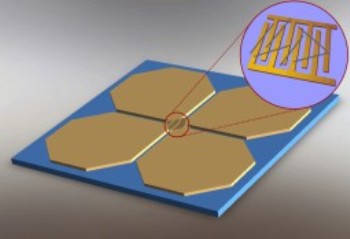Researchers at TU Darmstadt have collaborated with RhineMain Polytechnic to develop a nanosensor that detects very slight traces of pentaerythritol tetranitrate (PETN). PETN is a highly explosive chemical substance which terrorists have used for blasting commercial aircraft.
 NanoSensor developed by TU-Darmstadt
NanoSensor developed by TU-Darmstadt
Today, this chemical explosive can be identified through an ion-mobility spectrometer and also with the help of wipe tests. However, these tests consume a lot of time and effort and hence are conducted only for spot-checking at airports. Moreover, PETN displays minimal volatility and releases only few molecules in the surrounding atmosphere hence dogs trained to identify explosives and airport scanners find it very difficult to identify the explosive. The nanosensor developed by TU Darmstadt’s scientists is capable of identifying one individual PETN molecule in a cluster of 10 billion molecules of air.
Detection of PETN molecules using the sensor is done by passing ambient air over the sensor. Mario Boehme, Dipl. Ing, stated that if a single molecule of PETN reaches the nanotube of the sensor, the nitro particles present in PETN attach to the nanotube surface and alters its electrical conductivity. This alteration is identified by electronic instrumentation, he added.
According to Boehme, airports using traditional X ray machines and metal detectors at security checkpoints can be integrated with this nanosensor along with an instrument for air induction. This approach reduces time and effort in checking travelers and their belongings. Another way of checking passengers is to employ a portable device resembling a portable vacuum cleaner, he added.